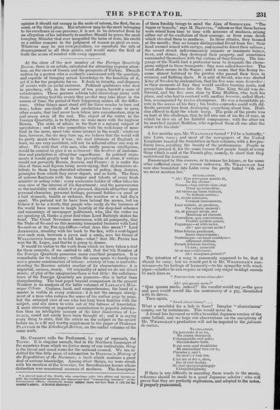At the close of the new number of the Foreign
Quarterly Review, there is an article, calculated for attracting popular atten-
tion, on the views of Russia and the prospects of Turkey. Though written by a person who is evidently conversant with the question, and capable of bringing actual knowledge to the handling of it, yet it is far too prophetic for us. It deals in futurity, and disposes of events with an awful rashness. Political quidnuncs who deal in prophecy, will, in the course of ten pages, foretell a score of catastrophes. These persons seldom take chronology along with them : granting that the events they predict may take place in the course of time, the period of their happening makes all the differ- ence. Other things must stand still for these oracles to turn out true ; before one-tenth of- their predictions have come to pass,
other events, that had never been taken into consideration, step in and sweep away all the rest. The. object of the writer in the
Foreign Quarterly, is to frighten us once more with the bugbear Russia. The state of affairs in the East is a natural subject of speculation ; and all who sympathize with the well-being of man- kind in the mass, must take some interest in the result : whatever face, however, the die may turn up, we believe that the world will be pretty much where it was ; the real interests of England, at least, we are very confident, will not be affected either one way or
other. We wish that able men, who really possess intelligence, would be content to give it us nettement ; the broderie of declama- tion aml prediction is altogether superfluous. In political argu- ments it would greatly tend to the prevention of error, if writers would not personify Russia, Austria, and France : it is under the idea of these said figures being never-dying, that diplomatists at- tribute to them long-cherished schemes of policy, deep designs, principles from which they never depart, and so forth. The fates of nations fluctuate with the temper and talents of every fresh minister or acting ruler: every successive holder of office takes his own view of the interest of his department ; and the perseverance or the instability with which it is pursued, depends altogether upon personal character, personal feelings, personal foibles—a good or a bad stomach, health or sickness, fine weather or a bad day's sport. We pretend not to have been behind the scenes, but we believe it to be a truth, that people who really do the business of the world have reason to laugh heartily at the deep-laid schemes and reasonings of newspaper politicians, who, like the writer we are speaking of, thinks a great deal when Lord Burleigh shakes his head. The Court Newsman announces, with all pomposity, that the Duke of So-and-so this morning transacted business with Lord So-and-so at the Foreign-Office—what does this mean?* Lord ABERDEEN, standing with his back to the fire, with a coat-lappel over each arm, between a yawn and a smile, sees his Grace of WELLINGTON lounge in to tell him—what ? that Mr. PETRE has won the St. Leger, and that he is going to dinner.
It would be unfair to the work from which we have taken a text for these remarks, if we omitted to add, that the` 5th Number of the Foreign Quarterly possesses many excellent properties. It is remarkable for its industry; within the same space we hardly ever saw a greater condensation of labour: sobriety of tone is (notwith- standing the Russian article) another of its characteristics : it is impartial, serious, steady. Of originality of mind we do not detect niuch; of play of the imagination there is but little : the collabora- teurs of the Foreign Quarterly are pioneers—this is better than sharpshooting. The best paper beyond comparison in the present Number is an analysis of the latter volumes of LAPLACE'S 21Eca- nique Celeste. Copious, lucid, and comprehensive, the hand of a master is visible in every sentence : it is not the Meagre abridg- ment of a man who reduces the sense of his author page by page, but the enlarged view of one who has long been familiar with the subject, and sits down to write out of the fulness of knowledge. A more interesting or important contribution to popular informa- tion than an intelligible account of the later discoveries of LA- PLACE, could not easily have been thought of; and it is saying every thing to state, that the article on the subject in the review before us, is a fit and worthy supplement to the paper of Professor PLAYFAIR in the Edinburgh Review, on the earlier volumes of the same work:


















 Previous page
Previous page